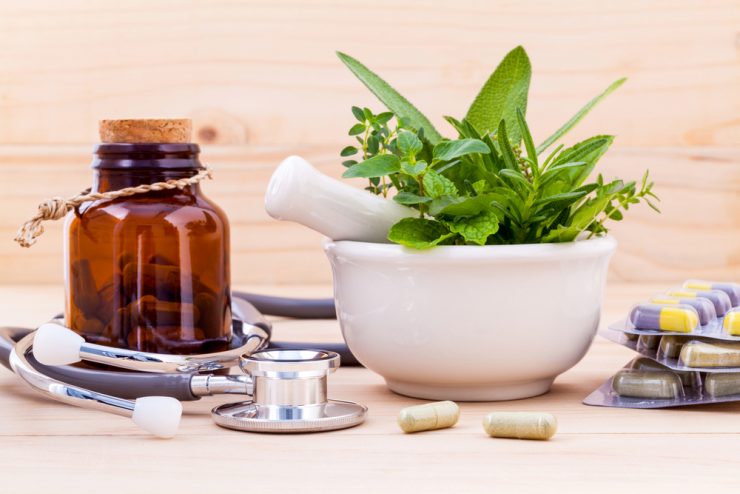Recent news suggests that finishing a course of antibiotics may not always be the right thing to do.
Medical herbalist Gabriella Clarke looks behind the headlines and suggests next time we get a cough or cold, we should look inside our kitchen cupboard before rushing off to the GP.
A recent review written by researchers from several UK institutions including Brighton and Sussex Medical School, the University of Oxford and the University of Southampton states that it may not always be necessary to complete a course of antibiotics[1]. This may sound controversial, but there is in fact very little research or evidence to suggest that it is beneficial to take antibiotics for extended periods.
Professor Peter Openshaw, president of the British Society for Immunology and professor of experimental medicine at Imperial College London, commented, “It could be that antibiotic use should be used only to reduce the bacterial burden to a level that can be coped with by the persons own immune system”.
Medical herbalists have always focused on supporting the body’s system so it can fight off diseases by itself. Although there is no doubt that antibiotics have revolutionized medicine and greatly contributed to combating serious infections and extending life expectancy, current thinking is we have come to rely on them too heavily, especially when it comes to treating mild infections.
For more serious problems or for infections that won’t go away, always make sure to see your GP, especially if you have a chronic illness, are elderly or for children.
But if you want to try something more natural, here are some alternative remedies available in your garden or kitchen cupboard that could help treat every day infections.
PELARGONIUM
As we enter the cold and flu season, this pelargonium is excellent for treating the symptoms of the common cold and respiratory viruses such as sore throat, blocked nose, coughs, fever and fatigue.
It can also be taken in cases of more severe infections such as bronchitis and may help reduce the duration of viruses. It is thought to work by preventing bacteria adhering to cells and stimulating the immune system to fight viruses more efficiently.
GARLIC
This pungent bulb contains a compound known as allicin known to have strong antibacterial, antiviral, antiparasitic and antifungal properties. Garlic is so potent that studies are being carried out on whether it may help combat the microbes that are resistant to antibiotic therapy[2].
Studies have also shown that allicin-rich extracts may be active against the pathogens responsible for urinary tract infections, gonorrhea (which is now resistant to antibiotics) and S aureus which is responsible for many infections common in hospitals[3]. Garlic may also help prevent gum infections especially when eaten fresh.
To get the most benefits, garlic should be added to meals preferably raw or only at the end of cooking so as not to destroy the allicin. If you are not keen on the taste, try taking a good quality garlic supplement.
HONEY
Honey has been popular for centuries as a natural alternative to antibiotics for coughs, colds and flu. Try hot water, honey, lemon and a little ginger for colds and fevers. For bronchitis and lung infections, try a teaspoon of chopped thyme (which is thought to have antibacterial properties) in a spoon of honey.
Honey can be used as an antiseptic treatment for skin wounds and ulcers. As honey is hygroscopic, meaning it draws water to it, it can draw out poisons and pus from wounds preventing infection from spreading as well as speeding up healing. Manuka honey may be active against helicobacter pylori which can be the cause of stomach ulcers.
ECHINACEA
Traditionally used in North America to treat snakebites, echinacea has a history of use in Europe for helping prevent, treat and shorten the duration of respiratory viruses. Its antibacterial action can help to prevent secondary infections such as bronchitis and pneumonia.
APPLE CIDER VINEGAR
It is impossible to list the many benefits of apple cider vinegar but one of them is its antibacterial action. One study showed that undiluted, it had some activity against E coli and salmonella both of which are responsible for food poisoning[4].
Another study showed it to be effective against Pseudomonas aeruginosa which is found mainly in hospitals and untreated hot tubs[5]. Apple cider vinegar can also be used to clean down kitchen worktops although it is not as potent as standard antibacterial cleaners.
[1] Llewelyn MJ, Fitzpatrick JM, Darwin E, et al. The antibiotic course has had its day (PDF, 1Mb). BMJ. Published online July 26 2017
[2] https://www.ncbi.nlm.nih.gov/pmc/articles/PMC4458355/
[3] https://www.sciencedaily.com/releases/2015/07/150710101332.htm























